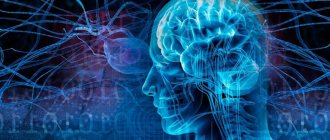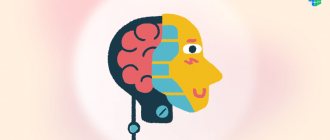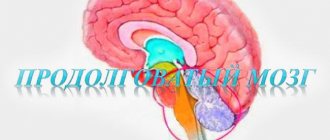Impairments in intelligence, memory and other higher mental functions are a symptom of many neurological diseases. Such changes arise due to the deterioration of neuronal communication between brain cells due to their gradual necrosis against the background of hypoxia, chronic intoxication, and age-related changes. A complex of such disorders is called cognitive personality disorder. Unfortunately, in some cases they are irreversible, but with timely consultation with a doctor, the pathological process can be slowed down. In other cases, dysfunction is caused by completely treatable diseases, which is why doctors at the Leto clinic pay great attention to a comprehensive examination of the patient, and we select treatment tactics after consultation with highly specialized specialists.
Etiology
The main risk factor for the development of personality disorders with cognitive impairment is age. By the age of 65, almost 30% of patients who come for regular examinations to a therapist complain of a deterioration in intelligence. Risk factors include:
- hypertension: it has been proven that an increase in systemic blood pressure for every 10 mm Hg. increases the risk of intellectual dysfunction by 7–12%;
- coronary heart disease;
- arrhythmia;
- excess weight and physical inactivity;
- hyperlipidemia, atherosclerosis.
In addition, the causes of the syndrome may be:
- deficiency of vitamin B12, folic acid, thiamine;
- hepatic, uremic, discirculatory encephalopathy;
- endocrine pathologies: hypothyroidism, thyrotoxicosis, insulinoma (benign tumor that produces insulin);
- respiratory failure;
- alcohol or drug intoxication;
- autoimmune and systemic diseases, for example, lupus, sarcoidosis, vasculitis;
- some infections: neurosyphilis, HIV, neuroborelliosis, previous meningitis, encephalitis;
- hydrocephalus;
- brain tumors, aneurysms, surgical interventions;
- consequences of traumatic brain injury, stroke;
- depressive and anxiety disorders.
The listed diseases, although difficult, are treatable, and with the right treatment tactics it is possible to completely restore all intellectual processes. The prognosis is much worse if symptoms appear due to dementia or Alzheimer's disease. In such cases, only symptomatic treatment is possible.
Treatment for mild cognitive impairment
Treatment is designed to prevent the development of dementia, slow down the rate of cognitive impairment, and eliminate existing disorders. Treatment should be etiotropic, pathogenetic and include the use of antioxidants, antiviral neurotransmitters, vasoactive drugs, chemotherapy, surgical removal of the tumor, as well as correction of vascular disorders, depression, and dysmetabolic changes.
- Drug therapy is selected individually and includes metabolic agents and nootropics;
- Psychocorrection should be carried out regularly. This includes memorizing texts and poems, art therapy. Exercises can be carried out together with a psychologist, in a group or individually. The patient is taught to form semantic and situational connections and analyze. Monitoring the effectiveness of exercises and alternating them is necessary;
- It is also important to review your diet and daily routine. Middle-aged and older people need to reduce the amount of salt and fat they consume and increase the amount of antioxidants. It is important to maintain a daily routine that includes moderate physical activity, rational alternation of work and rest, and proper sleep. It is very important for the patient to remain socially active.
Medical prognosis
In most cases, with timely etiotropic treatment, the prognosis for most patients is positive. With a regressive course of the underlying disease, the disturbances can be reduced. Cognitive decline slows or stops.
Clinical forms and features of the course
The main cognitive functions include:
- attention: the ability to maintain a certain level of mental and emotional activity;
- memory: the ability to remember, save and reproduce information;
- praxis: purposeful motor activity;
- gnosis: perception and interpretation of color, smell, visual images, tactile sensations, sounds;
- speech: understanding the meaning of what is said, the ability to formulate and express one’s own thoughts; this group of functions includes reading and writing;
- management of thinking, emotions and behavior, cognitive activity, fulfillment of assigned tasks and goals.
With cognitive personality disorder, there is an objective and subjective deterioration of all of the above functions compared to the original ones. In this case, the use of generally accepted age criteria is considered incorrect, since patients differ in their level of intelligence in general or in individual abilities. For example, if a person has a photographic memory and unique logical thinking, what is considered average is a significant deterioration for him.
Main types of syndrome
There are several forms of the disease:
- subjective , in which complaints of memory impairment are not confirmed by detailed psycho-emotional testing;
- mild, accompanied by a slight, mild intellectual deficit, which is noted during a neurological examination, but such disorders do not affect everyday and professional activity;
- moderate: the most common variant of the disease;
- severe (cognitive-compulsive personality disorder), manifested by severe impairments with complete loss of even basic everyday skills.
Important! According to clinical studies, subjective, not confirmed by general examination, and mild cognitive personality disorders are sometimes the very first symptoms of Alzheimer's disease, so they should not be ignored in any case.
Moderate deficiency syndrome
It is with this form of pathology that people most often consult a doctor. Depending on the prevalence of certain symptoms in adults, the following types of disease are distinguished:
- Monofunctional amnestic , in which only memory suffers, other functions are not affected. This type of disorder is often a harbinger of Alzheimer's disease.
- Monofunctional non-amnestic. There are no complaints about memory impairment, but intellectual inertia occurs (decreased concentration, lack of motivation, slow thinking).
- Multifunctional amnestic. The pathology affects memory and several other cognitive functions.
- Multifunctional non-amnestic. The patient perfectly remembers what happened to him before, is able to assimilate and reproduce new information, but at the same time other types of higher mental activity are disrupted (for example, speech, visual-spatial perception, etc.).
The influence of modern technologies on a child’s cognitive development
It cannot be said that if “virtual” information is abused, abstract thinking completely atrophies. But it becomes more difficult for the child to use it, build his own or understand other people’s logical relationships. But real life, where he will need these qualities, takes place outside the screen of a smartphone and computer.
High-quality communication, among other things, implies, for example, answers to endless children's questions that a child asks as he develops.
With the development of Internet technologies, children have gained wide access to all the information that humanity has accumulated over tens of thousands of years of its existence. But will they become smarter from this? The individual level of knowledge, according to the observations of experts, is decreasing, largely due to the fact that the new generation does not need to accumulate and interpret information on their own, when Internet technologies are available for this. But let’s not forget that technology is only a means, a useful tool for those who know how to use it, that is, perceive, compare and process the information received for the purposes they need. It turns out that children are receiving technology that allows them to do without abstract thinking and analytical abilities, but at the same time deprives them of the opportunity to reap its benefits. It is difficult for such children to create associative connections, their horizons are narrowed, so a general developmental delay soon begins. It is difficult to say what reasons it is primarily due to, organic (certain areas of the brain have not developed) or cultural, but based on the obvious, we can make an assumption in favor of the latter. Therefore, parents should pay attention to quality communication with their child, and not replace it with technical surrogates. High-quality communication, among other things, implies, for example, answers to endless children's questions that a child asks as he develops. In this case, it is not the reliable answers that are important, but the very fact of feedback from your child.
Diagnostic examination of patients
If you suspect a cognitive personality disorder, it is recommended to do the following:
- general clinical analysis of blood and urine;
- biochemical blood test, including electrolytes, calcium, glucose, liver and kidney function indicators, lipid spectrum;
- tests to assess the hormonal profile, levels of B vitamins and folic acid;
- CT or MRI of the brain;
- serological testing for markers of syphilis and HIV (if symptoms of the disease appear at a young or mature age);
- according to indications: ECG, chest x-ray, duplex scanning of cerebral vessels, study of cerebrospinal fluid to detect markers of Alzheimer's and dementia.
To assess the severity of the pathology, psychological testing is carried out, which consists of the following points:
- orientation in place, in time and one’s own personality: the patient is asked to name the date and place of birth, say where he is, etc.;
- a test for repeating the names of objects (sometimes it is necessary to explain their meaning), individual numbers in order or randomly;
- Praxis assessment: they are asked to perform several conscious actions, for example, fasten buttons, fold clothes;
- tests of visual-spatial perception: the patient is asked to draw simple or three-dimensional geometric figures, depict a dial and mark a certain time with arrows;
- pay attention to the peculiarities of speech, the ability to maintain a conversation;
- assessing intelligence by searching for logical associations (for example, they suggest finding something in common between a plum and an apricot).
The role of parents in shaping the child’s personality
The formation of cognitive abilities, although genetically determined, does not occur without the participation of parents. Unfortunately, the modern way of life imposes certain restrictions and requirements on this participation. The rhythm of life and the development of technology today often divide parents and children. Instead of communicating, engaging in their upbringing and development, parents replace their direct participation with technological gadgets or countless sections and groups of the so-called early development, where the child is sent almost from birth. Why are both dangerous for normal cognitive development? Technological gadgets (smartphones, computers and tablets) are designed in such a way that they operate mainly with visual information: icons and virtual objects are interpreted symbols, information that does not require any effort from the brain to recognize and perceive it. Thus, it deprives the child of the function of abstract thinking as unnecessary. The graphic information that a child sees in a book is more abstract - it forces the brain to work: it must interpret the image and its description, connect them together in its imagination, visualize the action or concept that they describe. This process involves certain parts of the cerebral cortex, which are responsible for the formation of abstract thinking, which is the pinnacle of cognitive development at an early age.
Cost of services
| CONSULTATIONS OF SPECIALISTS | |
| Initial consultation with a psychiatrist (60 min.) | 6,000 rub. |
| Repeated consultation | 5,000 rub. |
| Consultation with a psychiatrist-narcologist (60 min.) | 5,000 rub. |
| Consultation with a psychologist | 3,500 rub. |
| Consultation with Gromova E.V. (50 minutes) | 12,000 rub. |
| PSYCHOTHERAPY | |
| Psychotherapy (session) | 7,000 rub. |
| Psychotherapy (5 sessions) | 30,000 rub. |
| Psychotherapy (10 sessions) | 60,000 rub. |
| Group psychotherapy (3-7 people) | 3,500 rub. |
| Psychotherapy session with E.V. Gromova (50 minutes) | 12,000 rub. |
This list does not contain all prices for services provided by our clinic. The full price list can be found on the “Prices” , or by calling: 8(969)060-93-93. Initial consultation is FREE!
What are cognitive abilities
You've probably often wondered or entered into a discussion about what intelligence is and how to determine which person is smarter. We already clearly understand that a large amount of knowledge does not allow us to judge strong intelligence. This indicates well-readness and a large base of acquired information. Such people may achieve incredible success, or they may achieve nothing. Therefore, if we can say about a person that he is smart, then we mean, first of all, his developed cognitive abilities.
It should be noted right away that scientists do not have a clear point of view on what cognitive abilities are. For example, the ability to manage your emotions is not one of them, so this skill should be developed separately. This is emotional intelligence, which, however, is associated with cognitive abilities due to the characteristics of our body.
So, what is cognitive ability?
- Memory.
- Attention and concentration.
- Perception.
- Action.
- Making decisions.
- Imagination.
- Logical thinking.
Now let’s imagine a person who has mastered all these abilities. Can he be called smart and very talented? Undoubtedly. Such a person is able to remember a lot of information, or decide what to remember and what not. He knows how to concentrate and does not waste time trying to return to this state again and remember where he left off. He knows how to perceive and read information from the world or people’s behavior and draw the right conclusions. Can think logically and creatively at the same time. He makes firm decisions that result in correct actions.
This is why cognitive abilities are more important than any other. They are the very basis on which you can fully realize yourself in life. You can improve your memory, attention and concentration by taking this course.
Almost every person can develop these abilities. There are exercises that can improve any of these skills. What's even better is that mastering one skill has a positive impact on others. For example, concentration is associated with improved memory. And improving memory is closely intertwined with the development of creative thinking, because it forms tens and hundreds of associations in the head regarding any word, image or even sound.
If all these skills are sufficiently developed, then a person can enter a state called flow. In it, he remains mentally in the present moment, all his cognitive abilities, and especially concentration, are incredibly enhanced. He succeeds, he knows or feels what needs to be done to achieve results. There are people who have learned to remain in this state 24 hours a day. For example, Richard Branson, British billionaire. The level of his perception is simply amazing: he looks at the world and sees only possibilities.
Speaking about information, it must be said that, of course, knowledge is necessary. Even with its universal accessibility in the Internet era, curiosity and erudition are indicators of an interesting and extraordinary person. After all, if you know nothing and do not have any information, then your decisions will be quite primitive. Therefore, in addition to developing cognitive skills, you need to strive to acquire new knowledge so that you can use it by mixing, changing and getting something new and unusual. By taking a course on developing creative thinking, you will learn how to do this.
Below we present to your attention a list of books aimed at developing your cognitive abilities.
- Harry Lorraine "Development of memory and ability to concentrate"
- Eberhard Heul “The Art of Concentration: How to Improve Your Memory in 10 Days”
- Dmitry Gusev “A short course in logic: the art of correct thinking”
- Michael Mikalko "Rice Storm and 21 More Ways to Think Outside the Box"
- Dmitry Chernyshev “How people think”
- Frans Johansson "The Medici Effect"
- Peter Bregman "18 Minutes"
These books present a variety of ways to develop cognitive abilities. Therefore, you should not just read them for entertainment. Do the exercises armed with a piece of paper and a pen.
There are tons of apps online that are designed to improve your brain function. Here are the most interesting of them.
- Lumosity
- Peak
- Elevate
- Brain Wars
- Neuronation
Their main advantage is that if you have a smartphone, you can do exercises wherever you are. Also, all these applications keep detailed statistics. You will be able to monitor your results and clearly see your progress. Remember that you will ideally need to do this every day. Even if time is short, set aside at least 20-30 minutes daily.
If there is just one ability that will benefit your brain the most, it is concentration. It is she who “pulls up” all other cognitive skills. There are two simple games that help with this very well. These are “Numbers” and “Schulte Tables”.
Interested in developing cognitive abilities in a practical way? Then the course “Cognitive Science: Development of Thinking” is for you. Join us!
We wish you good luck!
We also recommend reading:
- Storytelling
- Cattell-Horn-Carroll theory
- How books make us better people
- 4brain and flow state
- Things that help you become smarter
- Cognitive simulators
- Intelligence and its development: several recommendations
- Types of memory and their features
- Ways to Improve Cognitive Learning
- Cognitive sphere of personality
- Rules and ways to improve memory
Key words:1Cognitive science
Principles of treatment
Therapy is prescribed only after receiving the results of a diagnostic examination. But usually treatment is aimed at:
- normalization of cerebral circulation, improvement of energy metabolism in brain cells, prevention of hypoxia;
- prevention of neurodegenerative changes;
- compensation for deficiency of B vitamins and other macro- and microelements, essential amino acids;
- therapy for concomitant disorders (use of antihypertensive and antiarrhythmic drugs, hepatoprotectors, etc.).
If the cause is not eliminated, cognitive personality disorder will progress: if in a mild form of the syndrome the patient only needs help managing finances and paying for utilities, at the stage of severe dementia the patient is completely dependent on others. In such cases, we offer hospitalization in our hospital, where the person will be under round-the-clock supervision by qualified and experienced medical personnel.
You can call a doctor or make an appointment at a clinic with our operators using a 24-hour anonymous phone number 8(969)060-93-93.
Possible complications
Progressive MCI without timely effective therapy can develop into dementia, which leads to the loss of self-care skills and the ability to solve everyday problems. This gives rise to problems of socialization - the circle of contacts narrows, the ability to work is lost, and the desire to attend public events disappears. With a fluctuating course, patients have difficulty performing intense mental tasks, while correct correction of the daily routine and reduction of stress allows them to maintain their usual lifestyle.









